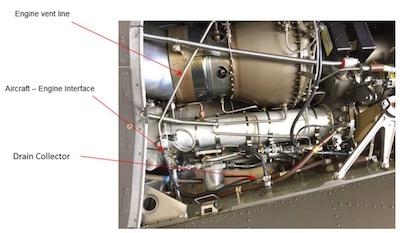Mon, Nov 27, 2017
January Accident May Be Related To Problem With Engine Oil Drain System
The FAA has issued a Special Airworthiness Information Bulletin (SAIB) warning of a possible blockage of the engine oil drainage system on Airbus Helicopters Deutschland (Airbus Helicopters) Model MBB-BK 117 C-2 helicopters.

On January 26, 2017 an operator of a BK117 C-2 experienced an in-flight engine fire and made an emergency landing in Sioux Falls, South Dakota. Although still under investigation, the engine fire could be related to engine oil coke chips plugging the return scavenge line for the rear bearing of the gas generator. On September 8, 2017 a BK117 C-2 helicopter was destroyed when it crashed near Hertford, North Carolina. The NTSB preliminary investigation found that the number 2 engine rear turbine shaft bearing exhibited discoloration consistent with overheating and lack of lubrication. Through the course of inspecting the engine issue for scavenge line blockage, a BK117 C-2 operator discovered a separate, airframe-related issue. The operator detected various levels of coking blockage of engine drain lines. Airbus Helicopters prescribes a general visual inspection of the bearing compartment area. There are no prescribed inspections of the drain tube or drain collector to check for blockage. A blocked
drain line may, under certain circumstances, present a risk for an engine fire and/or inflight shutdown of the affected engine.
The FAA recommends the actions below for all owners, operators, and maintainers of Airbus Helicopters BK117 C-2 helicopters. The actions should be performed for each engine at intervals not to exceed 100 hours time-in-service (TIS). Refer to Fig. 01 in Airbus Helicopters AMM 71-71-01, dated March 1, 2016 and to Figure 1 of this SAIB.
Disconnect the rear bearing lines part numbers AE709636-1 (hose), 117-600381.111 (hose), and 117-600381.105 (hose) from the drain collector part number B717M1028801 or 117-602061 (drain collector) and disconnect the drain collector from the engine deck.
Visually check the drain collector and hoses for obstructions. These obstructions may include carbon and coke deposits. Contact Airbus Helicopters for recommended cleaning procedures if there are any obstructions.
If there are no obstructions or after performing the above actions, reconnect the drain collector to the engine deck and reconnect the drain/vent lines to the drain collector per approved maintenance instructions.
(Image provided with FAA SAIB)
More News
“These new aircraft strengthen our ability to respond quickly, train effectively and support communities nationwide. Textron Aviation has been a steadfast supporter in helpin>[...]
From 2011 (YouTube Edition): Rugged, Legendary, STOL Twin Makes A Comeback The de Havilland Twin Otter is an airplane with a long history, and it gained a reputation as a workhorse>[...]
A Wind Gust Lifted The Right Wing And The Airplane Turned To The Left Analysis: The pilot was departing from a 2,395-ft-long by 50-ft-wide turf runway. The pilot reported that afte>[...]
Have A Story That NEEDS To Be Featured On Aero-News? Here’s How To Submit A Story To Our Team Some of the greatest new stories ANN has ever covered have been submitted by our>[...]
Braking Action Advisories When tower controllers receive runway braking action reports which include the terms “medium," “poor," or “nil," or whenever weather con>[...]
 Aero-News: Quote of the Day (12.18.25)
Aero-News: Quote of the Day (12.18.25) Classic Aero-TV: Viking Twin Otter 400--Bringing the DHC-6 Back Into Production
Classic Aero-TV: Viking Twin Otter 400--Bringing the DHC-6 Back Into Production NTSB Final Report: Rans Employee Flying Club Rans S-6ES Coyote II
NTSB Final Report: Rans Employee Flying Club Rans S-6ES Coyote II ANN FAQ: Submit a News Story!
ANN FAQ: Submit a News Story! ANN's Daily Aero-Term (12.18.25): Braking Action Advisories
ANN's Daily Aero-Term (12.18.25): Braking Action Advisories



